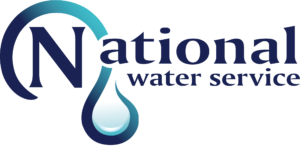Water Treatment Frequently Asked Questions
Always been interested in a water treatment system but not sure if it’s the right thing for your home or business? Has the process of filtering and purifying water left you concerned about installing a whole house system?
National Water Service is happy to provide answers to some of our most frequently asked questions from clients. Enjoy this water treatment FAQ to help you feel confident setting up a free water consultation with our water professionals today.
What is a water softener?
A water softener system for your home or business is a filtration system that removes high concentrations of calcium, magnesium, and other metal cations found in both city and well water. The act of “softening” your water leaves fewer stains on dishware, allows for less soap use, softens the hair and skin, and extends the lifespan of clothing and other laundry.
How much does a treatment system cost?
Determining the cost of your water treatment system depends on a few different factors. Water Companies like National Water Service take into account if the water treatment system is for a home or a business, if it is a whole house system or regulated to one area (like the kitchen only), if a reverse osmosis system is needed, and how many different filters may be needed. In most cases, the cost of the water treatment system works out to the same amount annually a family of four spends on filtered, bottled water for their home anyway.
What is a reverse osmosis treatment system?
A reverse osmosis system is a very thorough filtration system that removes contaminants, solids, minerals, and other molecules and substances from your water. Reverse osmosis systems use special membranes to help remove all of the contaminants. These systems can be installed under an individual sink (like for an office kitchen) or full house systems can be installed.
What causes hard water?
The cause of hard water almost always comes down to either high magnesium or high calcium deposits. Hard water can be found in both city water and well water. It is generally due to ground water flowing over limestone and picking up mineral content along the way.
How does a reverse osmosis water filtration system work?
A reverse osmosis water filtration system works by pushing pressurized water through various pre-filters that take out sediments, lead, carbon, and other impurities. The water passes through a semipermeable membrane and then out your faucet. RO systems provide water so pure it requires its own waterline and faucet to protect against corrosion.
What is a Whole House Water Treatment System?
National Water Service offers a whole house water treatment system, which is a water system that is applied directly to where the main water line enters your home. That ensures that your water is clean and safe, regardless of if you’re on city water or well water. Every faucet receives clean water with a whole house water treatment system, including showers, laundry, the dishwasher, kitchen sinks, bathroom faucets, and more.
How does your water softening system remove hardness?
A water softening system removes water hardness by applying filters that remove the harsh minerals. Filters remove large deposits of calcium and magnesium, softening the water for better cleanliness, softer skin, and more.
How much does treatment cost?
Water treatment costs depend on a few different factors. Some homes may only need a small treatment to fix their problem, while some homes may require a whole house reverse osmosis system. A free estimate on a water treatment system + water testing is the best way for your local water company to determine the cost of your water treatment.
What water treatment technology is best?
One of the best water treatments available today is the reverse osmosis water treatment system. Reverse osmosis systems are considered the best water treatment systems because they can clean up to 99% of impurities out of your water. A whole house RO system gives you healthy and safe water from your faucets, showers, laundry, and more.
What does reverse osmosis do?
Reverse osmosis is the filtration system that removes up to 99% of impurities from water. It uses a special membrane filtration system that actively works to remove and reduce lead, toxins, sodium, and other contaminants for better tasting drinking water, coffee, tea, and more.
HOW IS WATER TREATED TO MAKE IT SAFE FOR DRINKING?
Water treatment systems use various filters to remove and reduce contaminants found in water. These can be applied to offices or homes both on well water or city water. The filters trap the contaminants, which may be sediments, lead, or other substances, allowing only purified water to pass through and out of the faucets.

